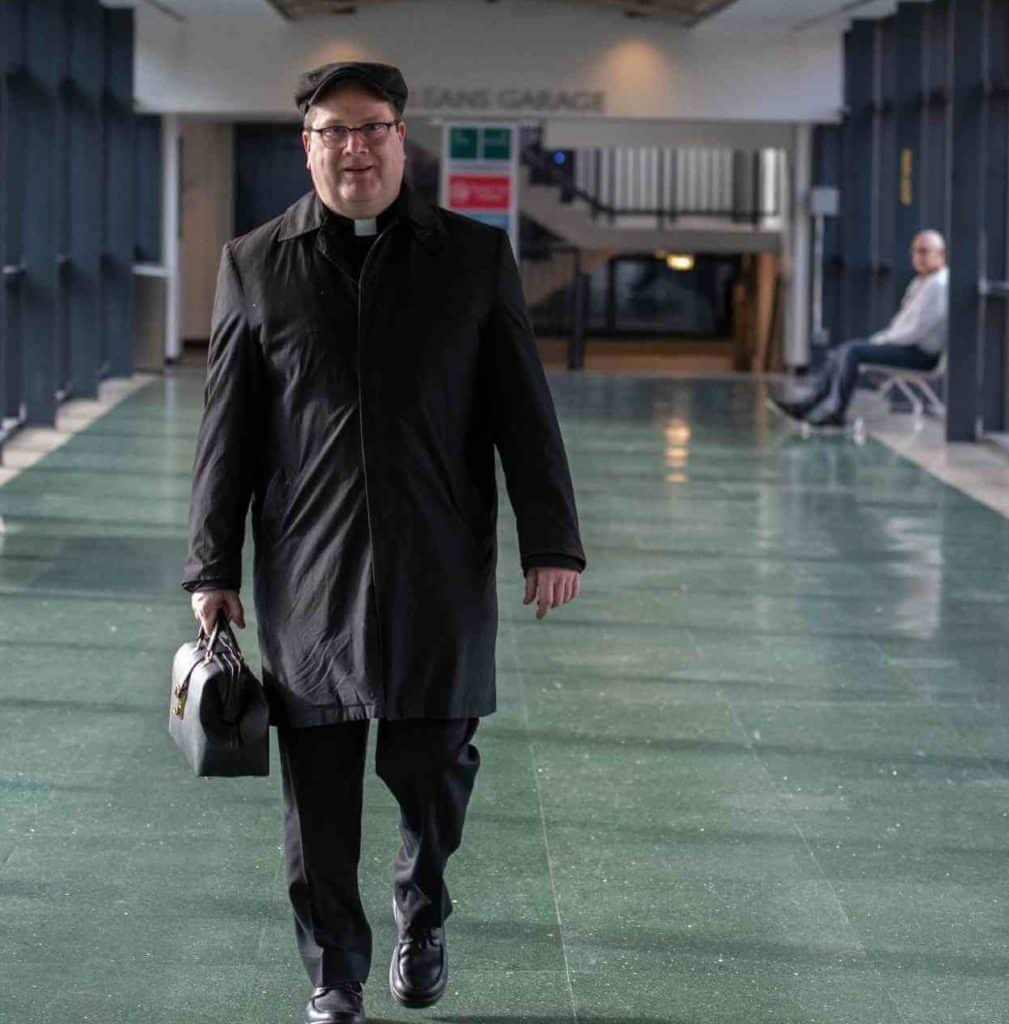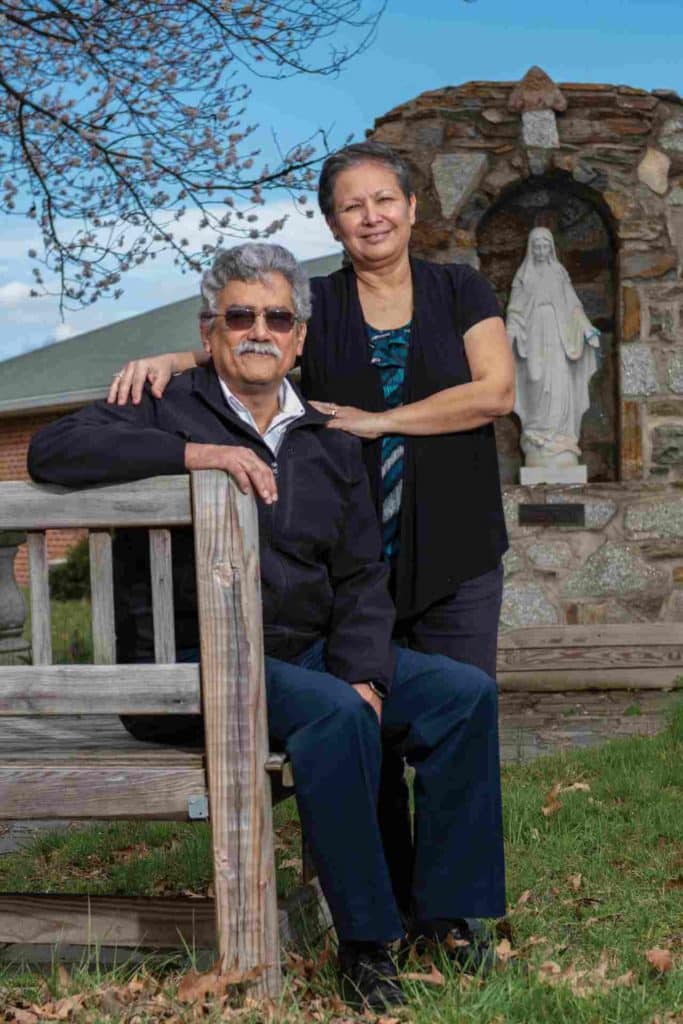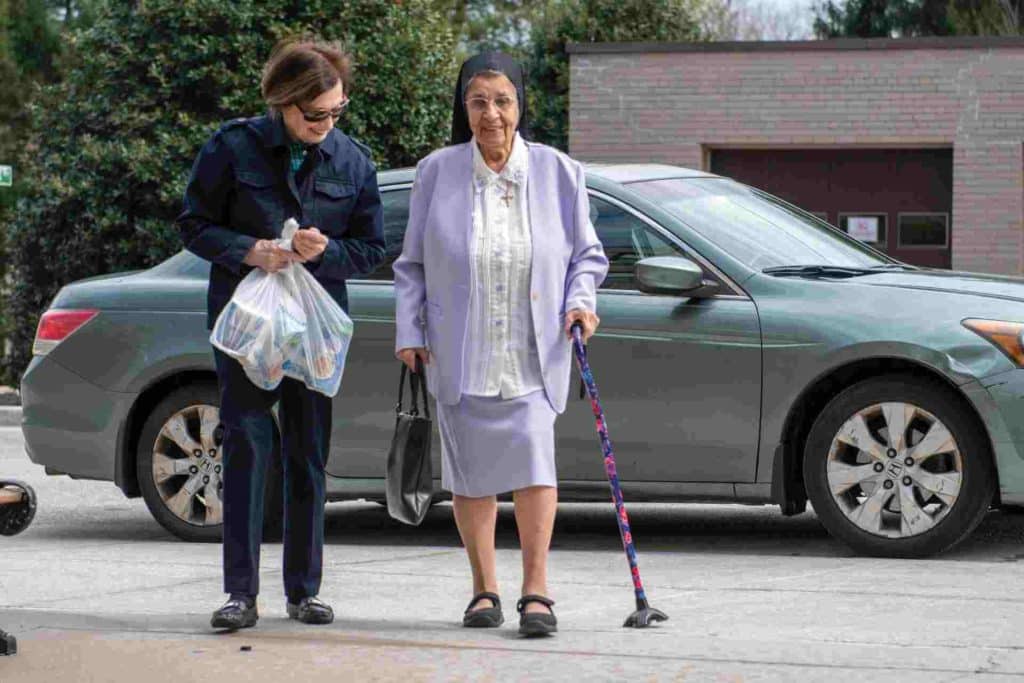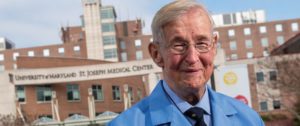FOURTH IN A SERIES: Throughout 2020, the Catholic Review will explore the Corporal and Spiritual Works of Mercy. In this third edition of the series, we explore visiting the sick.
George Adams is 83 and dealing with assorted medical issues. In 2015 he was diagnosed with lupus, an autoimmune disease that has since gone into remission, but not before it contributed to a partial hip replacement.
A former U.S. Marine, retired attorney and certified grief counselor, Adams has been a familiar face at Church of the Nativity in Timonium and Immaculate Conception in Towson, where he goes for Mass and the adoration chapel, respectively.
Since 2011, Adams has also been a spiritual care volunteer at the University of Maryland St. Joseph Medical Center in Towson, bringing Communion to Catholics and conversation and prayer to anyone he encounters.
“It’s not just handing out the Eucharist,” Adams said. “An important part is establishing rapport with people. It’s a wonderful ministry. If I could, I would be at St. Joseph (Medical Center) five days a week.”
All of that, of course, has been impossible since March 11, when Maryland Gov. Larry Hogan and the state’s health care systems began to restrict visitors to hospitals, nursing centers, and assisted living and retirement communities, because of the coronavirus.
Gone with those embargoes, for many ill and elderly, is the personal contact that nearly everyone is missing during this crisis. Once it lessens, the ministry to Visit the Sick will be more vital than ever, in whatever form it takes.
Front lines

“Visiting the sick is an important part of being a parish priest,” said Father Patrick Besel, who was ordained for the Archdiocese of Baltimore in 2006.
He moved from that role to a hospital chaplain in 2014, first at MedStar Franklin Square Hospital in Essex, and since autumn 2018 at The Johns Hopkins Hospital in East Baltimore.
“It’s huge,” Father Besel said, of a Hopkins brand that was internationally known before it became a clearing house for coronavirus data. “About 15 percent of the patients on any given day are Roman Catholic. At a community hospital (such as Franklin Square), that percentage is greater.”
His ministry includes accompanying the staff and welcoming the stranger.
“Most patients come from outside the archdiocese, because their local hospitals can’t provide the care they need. We have people from around the world here, and some don’t know how they’re going to get home,” he said, before the U.S. restricted international travel.
Father Besel was already accustomed to putting on a surgical gown, gloves and a mask to provide care for some patients and their families, including helping them discuss end-of life-measures. He has baptized newborns in the NICU, with the only witnesses being doctors, nurses and staff.
“They know the baby will not live much longer,” Father Besel said. “Jesus’s death and resurrection is happening right in front of you.”
Staff comprise most of those in the pews when he celebrates noon Mass, which last happened March 13. He described Sunday Masses with patients “with chemotherapy poles” that are particularly moving, and the joy of seeing someone discharged.
He has ministered by phone to several COVID-19 patients in quarantine. He continues to visit with patients and offer them Communion, but by mid-March was already feeling the strain of volunteer extraordinary ministers of holy Communion being among the visitors told to stay home.
“At some point, you have to leave,” Father Besel said. “It’s a hard experience, feeling limited and inadequate, but then you realize, it’s not me doing the work, it’s the Lord working through my limitations.”
Hands off

The staff of Christ the King Parish in Glen Burnie includes Deacon German Flores and his wife, Hillevi, a bilingual receptionist. Immigrants from Venezuela, their ministry to the parish’s Hispanic community usually involves a hands-on approach, not just to the physically ill, but also, he said, to those who are sick “spiritually.”
“We operate by word of mouth, at Mass,” Hillevi told the Review March 14, during a FaceTime interview. “A parishioner tells us, ‘somebody is in the hospital, somebody is in a nursing home,’ and we figure out how to help. That’s the way we work.”
Later that day, the Archdiocese of Baltimore suspended all public Masses. The night before, approximately 100 people attended the parish’s Stations of the Cross. It ended with a tutorial on social distancing, with Deacon Flores’ translation in Spanish going longer than scheduled.
“It’s not a matter of repeating what was said in English, I needed to go deeper,” he said. “This is going to be a struggle, because people are going to feel the need to be with the sick. In the Hispanic community, there’s always someone in the hospital, with the sick. We need to break the behavior, for our own good.”
“We talk,” his wife added, “about the Blessed Mother, and obedience.”
On Facebook Live, the parish offers Mass not just in English, but in Spanish. The parish’s response has included staff attempting to telephone each of the more than 1,000 people on its rolls who are 70 and over, to educate them about available resources and to pray. Now its at-home phone bank of 40 volunteers has moved that ministry on to those in the 55-70 demographic.
“The idea,” Deacon Flores said, “is being virtual company in these stressful times.”
He and his wife are the parents of three and grandparents of four. She also counts as “grandchildren” another two dozen she has helped save from abortion through her pro-life ministry.
The youngest, Henry, arrived Feb. 21 at Baltimore Washington Medical Center, where Deacon Flores baptized the infant after a traumatic delivery. The baby was transported to the University of Maryland Medical Center, where Hillevi told the father to take a break and visit his wife.
She spent the night in Baltimore, helping care for the child.
Vibrant volunteers

Adams, the volunteer at UM St. Joseph Medical Center, has led a life of service that began at the former Our Lady of Lourdes Parish in Ashburton, and then what were formerly known as Loyola High School and Loyola College.
He saw duty during the Tet Offensive, a pivotal battle during the Vietnam War; briefly attended the seminary; and as a lay Franciscan assisted the Marine Corps League with funerals.
He’s taken Communion to shut-ins while serving a number of parishes, including St. Elizabeth of Hungary in Highlandtown. At UM St. Joseph Medical Center, one of the last patients he comforted was a young woman battling pancreatic cancer.
“I leave there astounded by the presence of the Holy Spirit and the goodness of the people,” he said.
The volunteer roll at UM St. Joseph Medical Center includes Ginny Caruso, a parishioner of St. Ignatius in Baltimore who began helping there in 2010, after working 43 years in the Social Security Administration.
“If I had gone to lunch four times a week with friends, I would have become bored,” she said.
Caruso has also been a regular Tuesday visitor to Villa Asumpta, the retirement residence in Towson for the School Sisters of Notre Dame.
“I take the sisters shopping, then out to lunch,” she said. “I love the sisters. They’re funny, adorable; some of them ran hospitals. They have living saints there. When I leave, I tell them, ‘You don’t know how wonderful you make me feel.’ ”
Her March 10 visit was her last for now. In the interim, the School Sisters ask for correspondence from people, and intentions that they will add to their prayers (visit https://atlanticmidwest.org/locations).
People long not just for the time when they can share the Eucharist at a public Mass, but take it to the sick.
“People are truly hungering for the Eucharist,” Father Besel said. “In the future, people should consider being a eucharistic minister. They’re realizing how important the Eucharist is, especially for the sick and their families.”
Email Paul McMullen at pmcmullen@CatholicReview.org
Read more “Works of Mercy” stories here.
